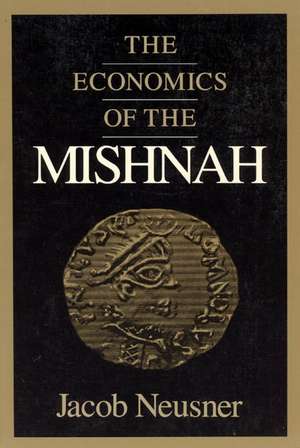The Economics of the Mishnah: Chicago Studies in the History of Judaism
Autor Jacob Neusneren Limba Engleză Paperback – 31 ian 1990
In this compelling study, Jacob Neusner argues that economics is an active and generative ingredient of the system of the Mishnah. The Mishnah directly addresses such economic concerns as the value of work, agronomics, currency, commerce and the marketplace, and correct management of labor and of the household. In all its breadth, the Mishnah poses the question of the critical place occupied by the economy in society under God's rule.
The Economics of the Mishnah is the first book to examine the place of economic theory generally in the Judaic system of the Mishnah. Jacob Neusner begins by surveying previous work on economics and Judaism, the best known being Werner Sombart's The Jews and Modern Capitalism. The mistaken notion that Jews have had a common economic history has outlived the demise of Sombart's argument, and it is a notion that Neusner overturns before discussing the Mishnaic economics.
Only in Aristotle, Neusner argues, do we find an equal to the Mishnah's accomplishment in engaging economics in the service of a larger systemic statement. Neusner shows that the framers of the Mishnah imagined a distributive economy functioning through the Temple and priesthood, while also legislating for the action of markets. The economics of the Mishnah, then, is to some extent a mixed economy. The dominant, distributive element in this mixed economy, Neusner contends, derives from the belief that the Temple and its designated castes on earth exercise God's claim to the ownership of the holy land. He concludes by considering the implications of the derivation of the Mishnah's economics from the interests of the undercapitalized and overextended farmer.
The Economics of the Mishnah is the first book to examine the place of economic theory generally in the Judaic system of the Mishnah. Jacob Neusner begins by surveying previous work on economics and Judaism, the best known being Werner Sombart's The Jews and Modern Capitalism. The mistaken notion that Jews have had a common economic history has outlived the demise of Sombart's argument, and it is a notion that Neusner overturns before discussing the Mishnaic economics.
Only in Aristotle, Neusner argues, do we find an equal to the Mishnah's accomplishment in engaging economics in the service of a larger systemic statement. Neusner shows that the framers of the Mishnah imagined a distributive economy functioning through the Temple and priesthood, while also legislating for the action of markets. The economics of the Mishnah, then, is to some extent a mixed economy. The dominant, distributive element in this mixed economy, Neusner contends, derives from the belief that the Temple and its designated castes on earth exercise God's claim to the ownership of the holy land. He concludes by considering the implications of the derivation of the Mishnah's economics from the interests of the undercapitalized and overextended farmer.
Din seria Chicago Studies in the History of Judaism
-
 Preț: 215.51 lei
Preț: 215.51 lei -
 Preț: 321.18 lei
Preț: 321.18 lei -
 Preț: 293.81 lei
Preț: 293.81 lei -
 Preț: 263.53 lei
Preț: 263.53 lei -
 Preț: 261.66 lei
Preț: 261.66 lei -
 Preț: 291.90 lei
Preț: 291.90 lei -
 Preț: 312.70 lei
Preț: 312.70 lei -
 Preț: 294.96 lei
Preț: 294.96 lei -
 Preț: 288.42 lei
Preț: 288.42 lei -
 Preț: 293.04 lei
Preț: 293.04 lei -
 Preț: 231.56 lei
Preț: 231.56 lei -
 Preț: 315.58 lei
Preț: 315.58 lei -
 Preț: 263.57 lei
Preț: 263.57 lei -
 Preț: 320.80 lei
Preț: 320.80 lei -
 Preț: 248.05 lei
Preț: 248.05 lei - 20%
 Preț: 160.30 lei
Preț: 160.30 lei - 22%
 Preț: 522.75 lei
Preț: 522.75 lei - 12%
 Preț: 310.42 lei
Preț: 310.42 lei - 16%
 Preț: 261.16 lei
Preț: 261.16 lei
Preț: 284.56 lei
Nou
Puncte Express: 427
Preț estimativ în valută:
54.45€ • 56.99$ • 45.32£
54.45€ • 56.99$ • 45.32£
Carte tipărită la comandă
Livrare economică 31 martie-14 aprilie
Preluare comenzi: 021 569.72.76
Specificații
ISBN-13: 9780226576565
ISBN-10: 0226576566
Pagini: 200
Dimensiuni: 152 x 229 x 18 mm
Greutate: 0.27 kg
Ediția:1
Editura: University of Chicago Press
Colecția University of Chicago Press
Seria Chicago Studies in the History of Judaism
ISBN-10: 0226576566
Pagini: 200
Dimensiuni: 152 x 229 x 18 mm
Greutate: 0.27 kg
Ediția:1
Editura: University of Chicago Press
Colecția University of Chicago Press
Seria Chicago Studies in the History of Judaism
Notă biografică
Jacob Neusner is member of the Institute for Advanced Study. His most recent book from the University of Chicago Press is Judaism and Christianity in the Age of Constantine.
Cuprins
Preface
1. The Economics of Judaism
2. The Initial Statement: The System of the Mishnah and Its Economics
3. Economics in Antiquity
4. The Mishnah's Market Economics: The Household
5. The Market
6. Wealth
7. The Mishnah's Distributive Economics: Householder, Market, Wealth
8. Theology, Class Ideology, and Distributive Economics: Cui Bono?
Appendixes
1. Toward the Analysis of Systems and the Comparison of Rationalities
2. The Mishnah in Canonical Context and the Next Stages in Study of the Economics of Judaism
Notes
Index
1. The Economics of Judaism
2. The Initial Statement: The System of the Mishnah and Its Economics
3. Economics in Antiquity
4. The Mishnah's Market Economics: The Household
5. The Market
6. Wealth
7. The Mishnah's Distributive Economics: Householder, Market, Wealth
8. Theology, Class Ideology, and Distributive Economics: Cui Bono?
Appendixes
1. Toward the Analysis of Systems and the Comparison of Rationalities
2. The Mishnah in Canonical Context and the Next Stages in Study of the Economics of Judaism
Notes
Index
